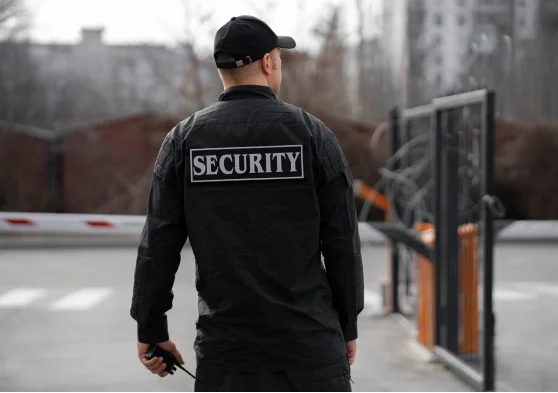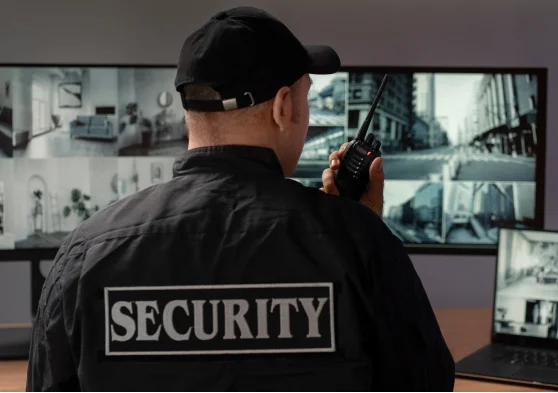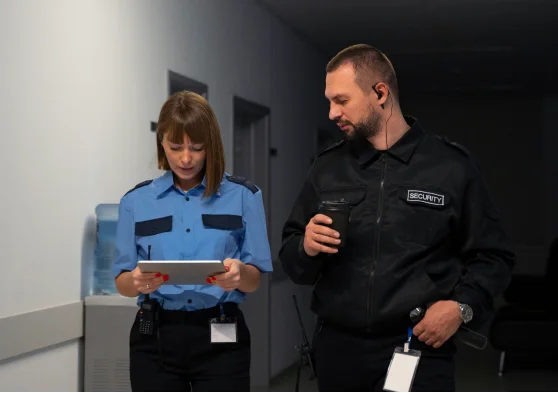Manufacturing plants and industrial facilities across New York—whether in Long Island, the Hudson Valley, or the industrial corridors of NYC’s outer boroughs—play a critical role in the supply chain. These sites are often sprawling, high-value operations that require tight security to protect equipment, raw materials, intellectual property, and personnel. In today’s environment, effective security for industrial sites must address physical threats, insider risks, sabotage, and regulatory compliance—especially in sectors like pharmaceuticals, food production, electronics, and defense.

Why Security Matters for Industrial Facilities in NY

- High-Value Assets
- Expensive machinery, tools, and inventory are prime targets for theft, vandalism, or sabotage.
- Workplace Safety
- Security protects employees from external threats (like trespassers or theft) and internal risks (such as violence or misconduct).
- Risk of Industrial Espionage
- Facilities involved in R&D, tech, or defense may be targets for data theft or sabotage.
- Compliance with OSHA, DHS, & C-TPAT
- Many manufacturers must meet federal safety and security regulations, especially in critical infrastructure or international trade.
- Supply Chain Continuity
- A security breach can delay operations, cause inventory loss, or halt production.
Essential Security Measures for NY-Based Manufacturing & Industrial Facilities
- Perimeter Security
- Fencing & Barriers: Secures the boundary of the site.
- Access-Controlled Gates: Entry for employees, vendors, and vehicles must be monitored.
- Vehicle Checkpoints: For high-risk or high-value facilities.
- Access Control Systems
- Employee Badges or Biometric Scanners: Restrict access to authorized areas (e.g., R&D labs, hazardous material zones).
- Visitor Management: Includes pre-screening, check-in, ID verification, and escorting.
- Time-Based Access Restrictions: To limit after-hours entry.
- Surveillance Systems
- CCTV with Infrared/Night Vision: Monitors entrances, equipment, production lines, and perimeters.
- Remote Monitoring: Centralized security centers can view multiple sites.
- Video Analytics: For motion detection, license plate recognition, or anomaly alerts.
- Security Personnel
- On-Site Guards: Patrol sensitive areas and respond to emergencies.
- Roving Vehicle Patrols: Useful for large or outdoor-heavy properties.
- Trained Industrial Security Teams: Knowledgeable in OSHA safety protocols and hazard zones.
- Inventory & Asset Protection
- Warehouse Security Systems: To track goods from production to storage.
- RFID or Barcode Scanning: For real-time inventory monitoring.
- Controlled Substance Lock-Up: Required in pharma and chemical plants.
- Cyber-Physical Integration
- SCADA & ICS Security: Industrial control systems must be isolated and monitored.
- Secure Wi-Fi and IoT: To protect connected machines and sensors.
- Physical Server Room Protection: With restricted access and backup power.
- Fire, Environmental & Emergency Systems
- Hazmat Emergency Protocols
- Fire Detection, Suppression & Alarm Integration
- Evacuation Plans & Drills
- Insider Threat Mitigation
- Employee Background Checks
- Incident Reporting Systems
- Anonymous Tip Lines
- Behavior Monitoring (within legal boundaries)

Types of NY Facilities That Require Security

- Pharmaceutical and Biotech Plants
- Food and Beverage Production Facilities
- Textile, Garment, and Packaging Manufacturers
- Automotive and Aerospace Assembly Sites
- Metalwork, Plastics, and Tool & Die Shops
- Industrial Distribution Centers & Logistics Yards
- Chemical Processing and Energy Generation Facilities

Benefits of Industrial Security

Benefit Outcome
- Loss Prevention Stops theft, vandalism, and inventory shrinkage
- Compliance Assurance Meets OSHA, DHS, FDA, and industry-specific regulations
- Worker Safety Reduces workplace violence and hazard exposure
- Operational Continuity Avoids shutdowns due to incidents or disruptions
- Insurance Savings Enhanced security can reduce liability and premiums

Security Challenges in NY’s Industrial Sector

- Urban vs. Rural Risks: NYC-area sites face high traffic & theft risk, while upstate sites face response time delays.
- Unionized Environments: Require careful integration of security policies with labor agreements.
- Aging Infrastructure: Some plants may lack modern security systems.
- Supply Chain Vulnerabilities: Third-party contractors or freight carriers can be weak points.

Conclusion

Security in New York’s manufacturing and industrial sector is about more than just theft prevention—it’s about maintaining operations, protecting workers, and preserving intellectual property and infrastructure. Whether you run a metal shop in Brooklyn or a biotech plant in Westchester, proactive security is essential for long-term sustainability.
